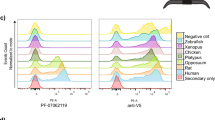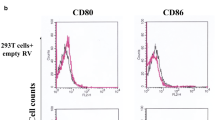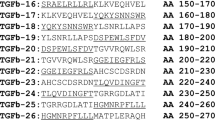Abstract
Guanylyl cyclase C (GUCY2C) is the index cancer mucosa antigen, an emerging class of immunotherapeutic targets for the prevention of recurrent metastases originating in visceral epithelia. GUCY2C is an autoantigen principally expressed by intestinal epithelium, and universally by primary and metastatic colorectal tumors. Immunization with adenovirus expressing the structurally unique GUCY2C extracellular domain (GUCY2CECD; Ad5-GUCY2C) produces prophylactic and therapeutic protection against GUCY2C-expressing colon cancer metastases in mice, without collateral autoimmunity. GUCY2C antitumor efficacy is mediated by a unique immunological mechanism involving lineage-specific induction of antigen-targeted CD8+ T cells, without CD4+ T cells or B cells. Here, the unusual lineage specificity of this response was explored by integrating high-throughput peptide screening and bioinformatics, revealing the role for GUCY2C-directed CD8+ T cells targeting specific epitopes in antitumor efficacy. In BALB/c mice vaccinated with Ad5-GUCY2C, CD8+ T cells recognize the dominant GUCY2C254–262 epitope in the context of H-2Kd, driving critical effector functions including interferon gamma secretion, cytolysis ex vivo and in vivo, and antitumor efficacy. The ability of GUCY2C to induce lineage-specific responses targeted to cytotoxic CD8+ T cells recognizing a single epitope mediating antitumor efficacy without autoimmunity highlights the immediate translational potential of cancer mucosa antigen–based vaccines for preventing metastases of mucosa-derived cancers.





Similar content being viewed by others

Abbreviations
- CMA:
-
Cancer mucosa antigen
- GMP:
-
Guanosine monophosphate
- GUCY2C:
-
Guanylyl cyclase C
- PKG:
-
Protein kinase G
References
DeFrancesco L (2010) Landmark approval for Dendreon’s cancer vaccine. Nat Biotechnol 28(6):531–532
Snook AE, Eisenlohr LC, Rothstein JL, Waldman SA (2007) Cancer Mucosa antigens as a novel immunotherapeutic class of tumor-associated antigen. Clin Pharmacol Ther 82(6):734–739
Lucas KA, Pitari GM, Kazerounian S, Ruiz-Stewart I, Park J, Schulz S, Chepenik KP, Waldman SA (2000) Guanylyl cyclases and signaling by cyclic GMP. Pharmacol Rev 52(3):375–414
Carrithers SL, Barber MT, Biswas S, Parkinson SJ, Park PK, Goldstein SD, Waldman SA (1996) Guanylyl cyclase C is a selective marker for metastatic colorectal tumors in human extraintestinal tissues. Proc Natl Acad Sci USA 93(25):14827–14832
Birbe R, Palazzo JP, Walters R, Weinberg D, Schulz S, Waldman SA (2005) Guanylyl cyclase C is a marker of intestinal metaplasia, dysplasia, and adenocarcinoma of the gastrointestinal tract. Hum Pathol 36(2):170–179
Schulz S, Hyslop T, Haaf J, Bonaccorso C, Nielsen K, Witek ME, Birbe R, Palazzo J, Weinberg D, Waldman SA (2006) A validated quantitative assay to detect occult micrometastases by reverse transcriptase-polymerase chain reaction of guanylyl cyclase C in patients with colorectal cancer. Clin Cancer Res 12(15):4545–4552
Waldman SA, Hyslop T, Schulz S, Barkun A, Nielsen K, Haaf J, Bonaccorso C, Li Y, Weinberg DS (2009) Association of GUCY2C expression in lymph nodes with time to recurrence and disease-free survival in pN0 colorectal cancer. Jama 301(7):745–752
Carlson MR (2009) Previstage GCC colorectal cancer staging test: a new molecular test to identify lymph node metastases and provide more accurate information about the stage of patients with colorectal cancer. Mol Diagn Ther 13(1):11–14
Snook AE, Stafford BJ, Li P, Tan G, Huang L, Birbe R, Schulz S, Schnell MJ, Thakur M, Rothstein JL, Eisenlohr LC, Waldman SA (2008) Guanylyl cyclase C-induced immunotherapeutic responses opposing tumor metastases without autoimmunity. J Natl Cancer Inst 100(13):950–961
Snook AE, Li P, Stafford BJ, Faul EJ, Huang L, Birbe RC, Bombonati A, Schulz S, Schnell MJ, Eisenlohr LC, Waldman SA (2009) Lineage-specific T-cell responses to cancer mucosa antigen oppose systemic metastases without mucosal inflammatory disease. Cancer Res 69(8):3537–3544
Cagir B, Gelmann A, Park J, Fava T, Tankelevitch A, Bittner EW, Weaver EJ, Palazzo JP, Weinberg D, Fry RD, Waldman SA (1999) Guanylyl cyclase C messenger RNA is a biomarker for recurrent stage II colorectal cancer. Ann Intern Med 131(11):805–812
Waldman SA, Cagir B, Rakinic J, Fry RD, Goldstein SD, Isenberg G, Barber M, Biswas S, Minimo C, Palazzo J, Park PK, Weinberg D (1998) Use of guanylyl cyclase C for detecting micrometastases in lymph nodes of patients with colon cancer. Dis Colon Rectum 41(3):310–315
Rammensee HG, Friede T, Stevanoviic S (1995) MHC ligands and peptide motifs: first listing. Immunogenetics 41(4):178–228
Parker KC, Bednarek MA, Coligan JE (1994) Scheme for ranking potential HLA-A2 binding peptides based on independent binding of individual peptide side-chains. J Immunol 152(1):163–175
Einarsdottir T, Lockhart E, Flynn JL (2009) Cytotoxicity and secretion of gamma interferon are carried out by distinct CD8 T cells during Mycobacterium tuberculosis infection. Infect Immun 77(10):4621–4630
McKelvey T, Tang A, Bett AJ, Casimiro DR, Chastain M (2004) T-cell response to adenovirus hexon and DNA-binding protein in mice. Gene Ther 11(9):791–796
Oehen S, Brduscha-Riem K (1998) Differentiation of naive CTL to effector and memory CTL: correlation of effector function with phenotype and cell division. J Immunol 161(10):5338–5346
Aichele P, Brduscha-Riem K, Oehen S, Odermatt B, Zinkernagel RM, Hengartner H, Pircher H (1997) Peptide antigen treatment of naive and virus-immune mice: antigen-specific tolerance versus immunopathology. Immunity 6(5):519–529
Li Z, Zhang M, Zhou C, Zhao X, Iijima N, Frankel FR (2008) Novel vaccination protocol with two live mucosal vectors elicits strong cell-mediated immunity in the vagina and protects against vaginal virus challenge. J Immunol 180(4):2504–2513
Buckwalter MR, Srivastava PK (2008) “It is the antigen(s), stupid” and other lessons from over a decade of vaccitherapy of human cancer. Semin Immunol 20(5):296–300
Carrithers SL, Parkinson SJ, Goldstein S, Park P, Robertson DC, Waldman SA (1994) Escherichia coli heat-stable toxin receptors in human colonic tumors. Gastroenterology 107(6):1653–1661
Conzelmann M, Dieterle CP, Linnemann U, Berger MR (2003) Cytokeratin 20 and guanylyl cyclase C mRNA is largely present in lymph node and liver specimens of colorectal cancer patients. Int J Cancer 107(4):617–628
Anderson MS, Venanzi ES, Klein L, Chen Z, Berzins SP, Turley SJ, von Boehmer H, Bronson R, Dierich A, Benoist C, Mathis D (2002) Projection of an immunological self shadow within the thymus by the aire protein. Science 298(5597):1395–1401
Schoenberger SP, Toes RE, van der Voort EI, Offringa R, Melief CJ (1998) T-cell help for cytotoxic T lymphocytes is mediated by CD40-CD40L interactions. Nature 393(6684):480–483
Bennett SR, Carbone FR, Karamalis F, Flavell RA, Miller JF, Heath WR (1998) Help for cytotoxic-T-cell responses is mediated by CD40 signalling. Nature 393(6684):478–480
Ridge JP, Di Rosa F, Matzinger P (1998) A conditioned dendritic cell can be a temporal bridge between a CD4+ T-helper and a T-killer cell. Nature 393(6684):474–478
Buller RM, Holmes KL, Hugin A, Frederickson TN, Morse HC III (1987) Induction of cytotoxic T-cell responses in vivo in the absence of CD4 helper cells. Nature 328(6125):77–79
Rahemtulla A, Fung-Leung WP, Schilham MW, Kundig TM, Sambhara SR, Narendran A, Arabian A, Wakeham A, Paige CJ, Zinkernagel RM et al (1991) Normal development and function of CD8+ cells but markedly decreased helper cell activity in mice lacking CD4. Nature 353(6340):180–184
Wu Y, Liu Y (1994) Viral induction of co-stimulatory activity on antigen-presenting cells bypasses the need for CD4+ T-cell help in CD8+ T-cell responses. Current biology: CB 4(6):499–505
Vezys V, Olson S, Lefrancois L (2000) Expression of intestine-specific antigen reveals novel pathways of CD8 T cell tolerance induction. Immunity 12(5):505–514
Vezys V, Lefrancois L (2002) Cutting edge: inflammatory signals drive organ-specific autoimmunity to normally cross-tolerizing endogenous antigen. J Immunol 169(12):6677–6680
Liu Z, Lefrancois L (2004) Intestinal epithelial antigen induces mucosal CD8 T cell tolerance, activation, and inflammatory response. J Immunol 173(7):4324–4330
Kurts C, Miller JF, Subramaniam RM, Carbone FR, Heath WR (1998) Major histocompatibility complex class I-restricted cross-presentation is biased towards high dose antigens and those released during cellular destruction. J Exp Med 188(2):409–414
Titu LV, Monson JR, Greenman J (2002) The role of CD8(+) T cells in immune responses to colorectal cancer. Cancer Immunol Immunother 51(5):235–247
Pages F, Kirilovsky A, Mlecnik B, Asslaber M, Tosolini M, Bindea G, Lagorce C, Wind P, Marliot F, Bruneval P, Zatloukal K, Trajanoski Z, Berger A, Fridman WH, Galon J (2009) In situ cytotoxic and memory T cells predict outcome in patients with early-stage colorectal cancer. J Clin Oncol 27(35):5944–5951
Galon J, Fridman WH, Pages F (2007) The adaptive immunologic microenvironment in colorectal cancer: a novel perspective. Cancer Res 67(5):1883–1886
Galon J, Costes A, Sanchez-Cabo F, Kirilovsky A, Mlecnik B, Lagorce-Pages C, Tosolini M, Camus M, Berger A, Wind P, Zinzindohoue F, Bruneval P, Cugnenc PH, Trajanoski Z, Fridman WH, Pages F (2006) Type, density, and location of immune cells within human colorectal tumors predict clinical outcome. Science 313(5795):1960–1964
Pages F, Berger A, Camus M, Sanchez-Cabo F, Costes A, Molidor R, Mlecnik B, Kirilovsky A, Nilsson M, Damotte D, Meatchi T, Bruneval P, Cugnenc PH, Trajanoski Z, Fridman WH, Galon J (2005) Effector memory T cells, early metastasis, and survival in colorectal cancer. N Engl J Med 353(25):2654–2666
Mocellin S, Rossi CR, Lise M, Nitti D (2004) Colorectal cancer vaccines: principles, results, and perspectives. Gastroenterology 127(6):1821–1837
Harrop R, Connolly N, Redchenko I, Valle J, Saunders M, Ryan MG, Myers KA, Drury N, Kingsman SM, Hawkins RE, Carroll MW (2006) Vaccination of colorectal cancer patients with modified vaccinia Ankara delivering the tumor antigen 5T4 (TroVax) induces immune responses which correlate with disease control: a phase I/II trial. Clin Cancer Res 12(11):3416–3424
Conry RM, Khazaeli MB, Saleh MN, Allen KO, Barlow DL, Moore SE, Craig D, Arani RB, Schlom J, LoBuglio AF (1999) Phase I trial of a recombinant vaccinia virus encoding carcinoembryonic antigen in metastatic adenocarcinoma: comparison of intradermal versus subcutaneous administration. Clin Cancer Res 5(9):2330–2337
Nagorsen D, Thiel E (2006) Clinical and immunologic responses to active specific cancer vaccines in human colorectal cancer. Clin Cancer Res 12(10):3064–3069
Colorectal Cancer (2003) In: Stewart BW, Kleihues P (eds) World cancer report. International Agency for Research on Cancer, Lyon, pp 198–202
Schafer H, Schafer A, Kiderlen AF, Masihi KN, Burger R (1997) A highly sensitive cytotoxicity assay based on the release of reporter enzymes, from stably transfected cell lines. J Immunol Methods 204(1):89–98
Mule JJ, Shu S, Schwarz SL, Rosenberg SA (1984) Adoptive immunotherapy of established pulmonary metastases with LAK cells and recombinant interleukin-2. Science 225(4669):1487–1489
Acknowledgments
We would like to thank Dr. Mathew Thakur and the members of the Small Animal Imaging Core Facility, Thomas Jefferson University, for their assistance in PET/CT imaging. Financial support was provided by the National Institutes of Health (CA75123, CA95026) and Targeted Diagnostic and Therapeutics Inc. (to S.A.W.); Measey Foundation Fellowship (to A.E.S.); S.A.W is the Samuel M.V. Hamilton Endowed Professor. This project is funded, in part, by a grant from the Pennsylvania Department of Health. The Department specifically disclaims responsibility for any analyses, interpretations, or conclusions. S.A.W is the chair of the Data Safety Monitoring Board for the C-Cure Trial™ sponsored by Cardio Biosciences, and the chair (uncompensated) of the Scientific Advisory Board to Targeted Diagnostics and Therapeutics, Inc., which provided research funding that, in part, supported this work and has a license to commercialize inventions related to this work.
Author information
Authors and Affiliations
Corresponding author
Rights and permissions
About this article
Cite this article
Snook, A.E., Magee, M.S., Marszalowicz, G.P. et al. Epitope-targeted cytotoxic T cells mediate lineage-specific antitumor efficacy induced by the cancer mucosa antigen GUCY2C. Cancer Immunol Immunother 61, 713–723 (2012). https://doi.org/10.1007/s00262-011-1133-0
Received:
Accepted:
Published:
Issue Date:
DOI: https://doi.org/10.1007/s00262-011-1133-0



